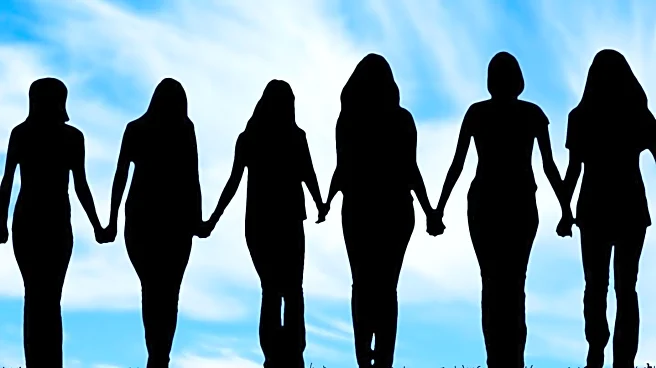What's Happening?
The narrative surrounding single women has evolved significantly, with many now experiencing higher levels of happiness and fulfillment. According to recent studies, single women are thriving, contrary to traditional stereotypes that depict them as lonely
or desperate for romantic partners. The number of unmarried women is projected to increase annually, with 45% of women aged 25 to 44 expected to be single by 2030. Factors contributing to this trend include later marriages, increased focus on education and career, and changing cultural norms. Single women report higher overall well-being compared to single men, with stronger social networks and greater emotional support from diverse sources.
Why It's Important?
This shift in the perception and reality of single women has broader implications for societal norms and gender roles. As single women continue to thrive, they challenge traditional expectations of marriage and motherhood, promoting a more inclusive understanding of happiness and fulfillment. This trend could influence public policy, workplace dynamics, and social services, as the needs and contributions of single women become more recognized. The growing number of single women may also impact economic factors, such as housing markets and consumer behavior, as they increasingly live independent lives.
What's Next?
As the number of single women rises, societal structures may need to adapt to better support their lifestyles. This could include changes in housing policies, financial services, and social programs to accommodate the unique challenges faced by single individuals. Additionally, the increasing visibility and influence of single women may lead to shifts in cultural narratives, further normalizing singlehood as a valid and fulfilling life choice. Researchers and policymakers may continue to explore the implications of this demographic shift, seeking ways to enhance the well-being and opportunities for single women.
Beyond the Headlines
The rise of single women also highlights deeper cultural shifts, such as the growing emphasis on personal autonomy and mental health. Single women often prioritize their own needs and well-being, challenging societal norms that equate happiness with romantic relationships. This focus on self-care and independence may inspire broader conversations about the value of individual fulfillment and the importance of diverse social connections. As single women redefine happiness, they contribute to a more nuanced understanding of what it means to lead a successful and satisfying life.















